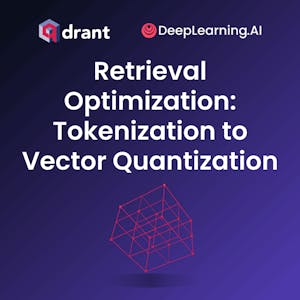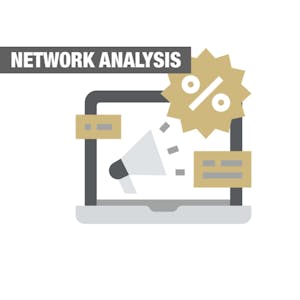Retrieval Optimization: Tokenization to Vector Quantization

$49
ENROLL NOWCourse Overview
In Retrieval Optimization: Tokenization to Vector Quantization, taught by Kacper Łukawski, Developer Relations Lead of Qdrant, you’ll learn all about tokenization and also how to optimize vector search in your large-scale customer-facing RAG applications. You’ll explore the technical details of how vector search works and how to optimize it for better performance. This course focuses on optimizing the first step in your RAG and search results. You’ll see how different tokenization techniques like Byte-Pair Encoding, WordPiece, and Unigram work and how they affect search relevancy. You’ll also learn how to address common challenges such as terminology mismatches and truncated chunks in embedding models. To optimize your search, you need to be able to measure its quality. You will learn several quality metrics for this purpose. Most vector databases use Hierarchical Navigable Small Worlds (HNSW) for approximate nearest-neighbor search. You’ll see how to balance the HNSW parameters for higher speed and maximum relevance. Finally, you would use different vector quantization techniques to enhance memory usage and search speed. What you’ll do, in detail: 1. Learn about the internal workings of the embedding model and how your text is turned into vectors. 2. Understand how several tokenizers such as Byte-Pair Encoding, WordPiece, Unigram, and SentencePiece are trained. 3. Explore common challenges with tokenizers such as unknown tokens, domain-specific identifiers, and numerical values, that can negatively affect your vector search. 4. Understand how to measure the quality of your search across several quality metrics. 5. Understand how the main parameters in HNSW algorithms affect the relevance and speed of vector search and how to optimally adjust these parameters. 6. Experiment with the three major quantization methods, product, scalar, and binary, and learn how they impact memory requirements, search quality, and speed. By the end of this course, you’ll have a solid understanding of how tokenization is done and how to optimize vector search in your RAG systems.
Course FAQs
What are the prerequisites for 'Retrieval Optimization: Tokenization to Vector Quantization'?
Prerequisites for this continuing education class are set by DeepLearning.AI. Most professional development online classes benefit from some prior knowledge. Please check the provider's page for specific requirements.
Will I receive a certificate for this CE class?
Yes, upon successful completion, DeepLearning.AI typically offers a shareable certificate to showcase your new skills and fulfill your continuing education requirements.
How long does this online course take to complete?
Completion times for online continuing education courses vary. The provider's website will have the most accurate estimate of the time commitment needed.





